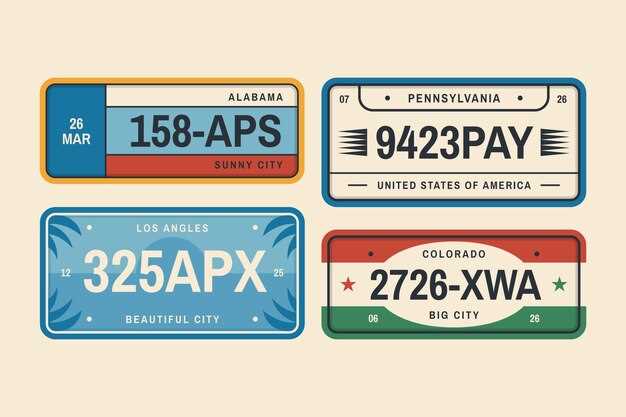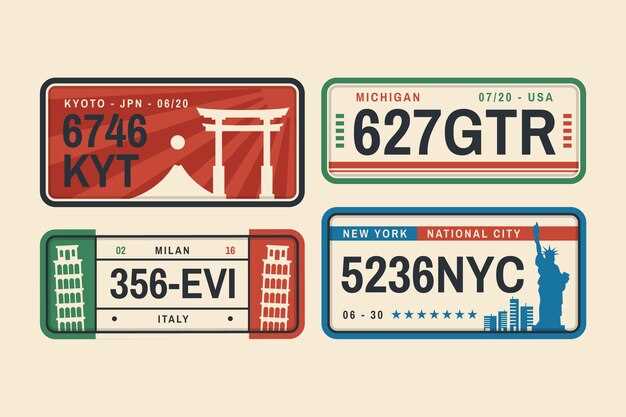
The use of decorative license plate covers has gained popularity among vehicle owners looking to personalize their cars. However, while these accessories can add a unique touch to a vehicle’s exterior, it’s essential to understand the legal implications surrounding their use. Different regions have varying laws and regulations regarding license plate covers, which may impact drivers’ choices and compliance with local statutes.
Regulatory Framework surrounding license plate covers typically aims to ensure clarity and legibility of vehicle identification. In many states, any item that obstructs the visibility or readability of a license plate can lead to legal penalties. This includes certain types of decorative covers that may not meet state specifications. Understanding these regulations is crucial for avoiding potential fines or complications during traffic stops.
Moreover, the legal status of decorative license plate covers can differ significantly based on local jurisdictions. In some areas, covers are allowed as long as they are transparent and do not distort the characters on the plate. In contrast, other places may outright prohibit specific designs or materials. Thus, it is imperative for car owners to familiarize themselves with their local laws to ensure that their decorative choices remain compliant and do not unintentionally become a source of legal trouble.
Understanding State Regulations for Decorative License Plate Covers

Decorative license plate covers can enhance the aesthetic appeal of a vehicle, but their legality varies by state. Understanding these regulations is crucial for vehicle owners to avoid fines or legal complications.
Here are some key points to consider regarding state regulations on decorative license plate covers:
- Visibility: Most states require that license plates remain fully visible. Covers that obstruct any part of the plate, including state names, registration numbers, or issuance dates, may be illegal.
- Material: Certain states specify acceptable materials for license plate covers. For example, covers must be made of transparent plastic to ensure readability of the plates underneath.
- Advertising: Some states prohibit decorative covers that contain any form of advertisement. Covers should not promote businesses or products unless specifically authorized.
- Installation: Improper installation can lead to violations. States may have guidelines on how covers should be affixed to prevent them from becoming loose or obstructive.
- Exceptions: Some states may grant exceptions for specific types of covers, such as those designed for particular events or charities. Always check local laws for any allowances.
To ensure compliance:
- Check the local Department of Motor Vehicles (DMV) or equivalent authority for specific regulations regarding license plate covers.
- Review state laws on vehicle modifications to understand any prohibitions or requirements.
- Remain informed about any changes to legislation that may affect the legality of your decorative covers.
In summary, while decorative license plate covers can be a fun accessory, it’s essential to stay informed about state regulations to ensure you remain compliant.
Potential Legal Consequences of Using Non-Compliant Plate Covers

The use of non-compliant decorative license plate covers can lead to several legal ramifications for vehicle owners. Each state has specific regulations concerning license plate visibility and readability. If a cover obscures essential information, such as the registration number, state name, or expiration date, it may violate local traffic laws.
One major consequence includes receiving fines or citations from law enforcement. Officers may issue tickets for violating vehicle registration laws if they determine that the plate cover obstructs the view of the registration details. These fines can vary widely, depending on the jurisdiction and severity of the violation.
Additionally, persistent non-compliance may result in more severe penalties, including points being added to the driver’s record. Accumulating points can lead to increased insurance premiums and potential suspension of the driver’s license. In some instances, a non-compliant plate cover may also be considered evidence of a lack of intent to follow vehicle laws, which could complicate legal situations during traffic stops or accidents.
Moreover, using decorative covers that infringe on copyright or trademark protections could expose vehicle owners to more serious legal challenges. If a cover features logos, images, or slogans without proper authorization, it risks copyright infringement claims, which can result in civil lawsuits and financial liabilities.
In conclusion, while decorative license plate covers may seem harmless and provide a way to express personal style, vehicle owners should be aware of the potential legal consequences. Ensuring compliance with local regulations is imperative to avoid fines, points on the driving record, and possible legal disputes.
Best Practices for Choosing Decorative License Plate Covers within Legal Limits
When selecting decorative license plate covers, it is essential to adhere to legal guidelines to avoid fines or issues with law enforcement. First and foremost, check your state’s specific regulations regarding license plate covers. Many states have laws that dictate what is permissible, such as transparency requirements, which ensure that license plate numbers are fully visible.
Choose covers made from high-quality materials that do not obstruct key elements of the license plate. Transparent or clear covers are often recommended, as they provide protection to the plate while maintaining visibility. Avoid designs that include reflective or tinted elements, as they may hinder readability and lead to legal complications.
Opt for simple designs that enhance the aesthetic without overwhelming or obscuring the plate’s information. Decorative elements, such as themed graphics or frames, should complement the plate’s visibility rather than distract from it. Additionally, consider using covers that are specifically designed to fit standard license plates to ensure a proper fit that adheres to size regulations.
Always ensure that the choice of cover does not interfere with registration stickers or other important elements displayed on the plate. Some states require the visibility of these items for compliance, so it is crucial to leave those areas unobstructed. Research local laws before making a purchase to avoid items that may be considered illegal.
Additionally, purchase decorative covers from reputable manufacturers or retailers that are knowledgeable about local laws. This ensures that the products are compliant and reduces the risk of inadvertently violating any regulations. It is also wise to keep the receipt and any documentation proving the legality of the cover in case it is questioned by law enforcement.
Lastly, remember that while personal expression through decorative license plate covers is encouraged, adhering to legal requirements should always remain a priority. By following these best practices, you can enjoy customization without facing penalties or legal issues.
